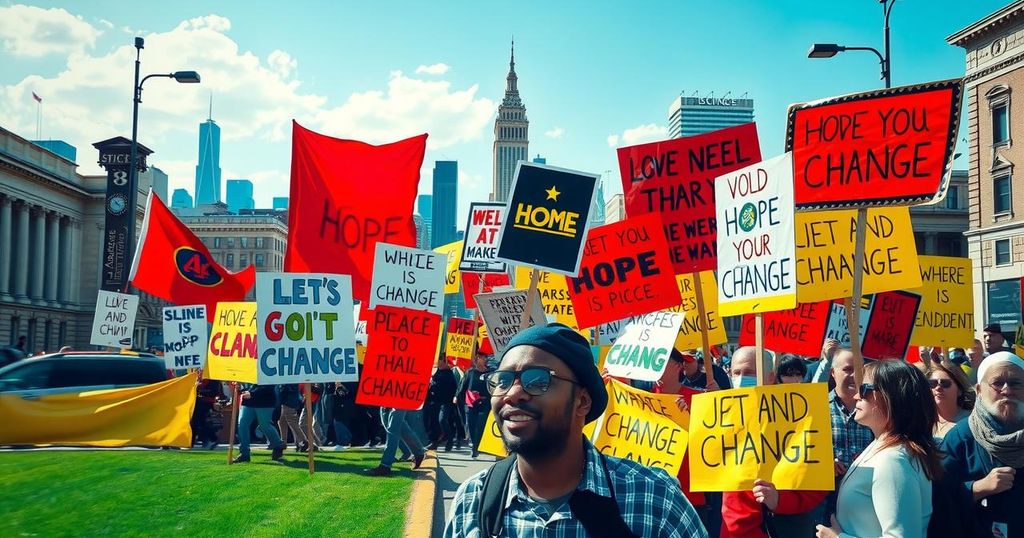Politics
AFRICA, ANGOLA, AZ, AZAGAIA, DANIEL CHAPO, DEMOCRACY, DEMOCRATIC MOVEMENT OF MOZAMBIQUE, DEUTSCHE WELLE, EL, ELVINO DIAS, FRELIMO, LUANDA, MAPUTO, MONDLANE, MOZAMBIQUE, MOZAMBIQUE LIBERATION FRONT, NORTH AMERICA, OPTIMISTIC PARTY FOR THE DEVELOPMENT OF MOZAMBIQUE, PROTEST, PROTESTS, SOCIAL ISSUES, UNITED STATES
Isaac Bennett
0 Comments
Mozambique’s Protests Spark Solidarity Movements and Concerns in Angola
Following the controversial October 2024 elections in Mozambique, widespread protests erupted due to police violence and skepticism about the electoral process favoring the ruling FRELIMO party. This movement has sparked solidarity protests in Angola, reflecting shared grievances over economic distress and political repression. Both nations face a critical juncture, as civil society mobilizes for change against entrenched political structures.
Since late October 2024, Mozambique has experienced an increase in protests, which initially focused on the murder of Elvino Dias and Paulo Guambe. These protests have evolved in response to police violence against demonstrators and widespread skepticism regarding the election results that favored the ruling FRELIMO party. The protests have involved individuals from diverse backgrounds who unite in their calls for justice and reform.
The protests have involved placards featuring protest songs like “People in Power” by Azagaia, whose lyrics critique the government. Despite the installation of newly elected officials, including President Daniel Chapo, the demonstrations continued, notably culminating in a general strike called by Venâncio Mondlane, a key opposition figure. A poignant question arose during protests: “Why are they going to kill us? Because we Mozambicans like you?” highlighting the urgent concerns regarding police brutality against peaceful citizens.
According to Plataforma Decide, an organization monitoring the elections and human rights, over 300 people have died and more than 600 have suffered injuries since the onset of protests on October 21, 2024. In a related development, Angola has witnessed protests aligning with Mozambique’s plight. Similar police violence has been reported in Angola, representing a broader call for justice amid rising unrest in political circumstances.
FRELIMO has maintained its political dominance in Mozambique since 1975, the year of independence from Portuguese rule. Conversely, the political landscape has evolved with PODEMOS, which emerged as a significant force in the latest elections, challenging traditional parties such as RENAMO and MDM. PODEMOS gained traction due to public dissatisfaction with corruption and social inequality, securing parliamentary representation that reflects growing demand for change.
Venâncio Mondlane, a former member of RENAMO and now a key figure within PODEMOS, advocates for national dialogue and social reform. However, the recent elections faced allegations of fraud and irregularities, prompting RENAMO and MDM to contest the results. Although the authorities invited these parties for dialogue post-elections, discontent persists regarding the electoral process and its authenticity.
Security forces have responded aggressively to protesters, deploying tear gas and live ammunition, leading to significant casualties. Human rights organizations like Amnesty International and Human Rights Watch have criticized the excessive force used against demonstrators and the arbitrary arrest of protesters and journalists. This situation has drawn international condemnation and calls for the government to engage with opposition factions in dialogue to resolve tensions.
In Angola, discontent mirrors that of Mozambique, driven by economic challenges, corruption, and a scarcity of democratic freedoms. Amidst tensions, protesters in Luanda echoed sentiments against police brutality and expressed their discontent with the government’s handling of socio-economic conditions. This unrest reflects fears in Angola’s leadership regarding Mozambique’s instability spilling over into their territory.
Despite the government’s silence on Mozambique’s situation, civil society in Angola is mobilizing. Influenced by Mozambican activists, initiatives like “Conversations from Our Yard” highlight issues of nonviolence and solidarity. Furthermore, local NGOs Mizangala Tuyenu Kupolo and Handeka have documented human rights violations in Angola and emphasize the need for continued monitoring of protests and civil liberties, with a report expected in 2025.
The wave of protests in Mozambique since October 2024, fueled by police violence and distrust of electoral integrity, has resonated beyond its borders, inspiring similar unrest in Angola. The complexities of political dominance, socio-economic challenges, and human rights violations reveal a broader struggle for justice and democracy. Civil society in both countries is increasingly engaged, urging accountability and reform, while international organizations call for dialogue and resolution.
Original Source: globalvoices.org




Post Comment